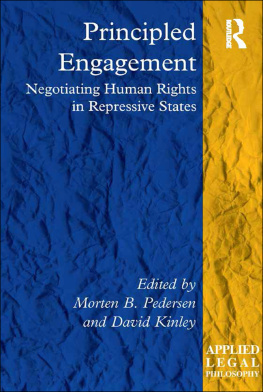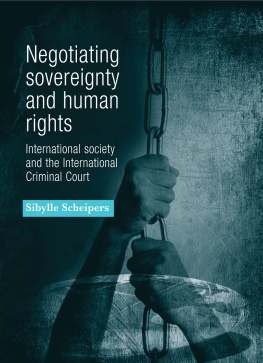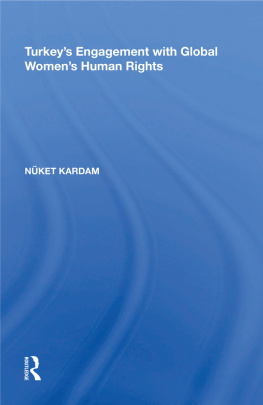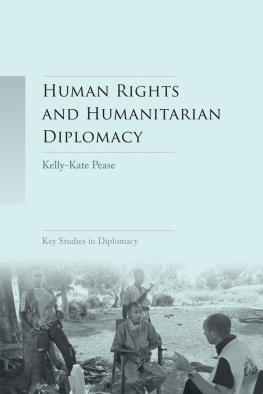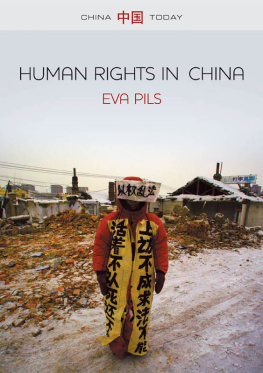PRINCIPLED ENGAGEMENT
As an early anti-apartheid campaigner I was a very reluctant convert to any kind of dealing with repressive regimes. But experience with Myanmar and elsewhere has taught me that careful, selective engagement can advance human rights in the hardest of situations. The case studies and foreign policy and aid strategies analysed here deserve the attention of all serious-minded policymakers. Principled Engagement is intelligent, lucidly written and compelling.
Gareth Evans, Foreign Minister of Australia 198896, President of the International Crisis Group 200009, Chancellor of The Australian National University, Australia
Principled Engagement
Negotiating Human Rights in Repressive States
Edited by
MORTEN B. PEDERSEN
University of New South Wales, Australia
DAVID KINLEY
Sydney University, Australia
First published 2013 by Ashgate Publishing
Published 2016 by Routledge
2 Park Square, Milton Park, Abingdon, Oxon OX14 4RN
711 Third Avenue, New York, NY 10017, USA
Routledge is an imprint of the Taylor & Francis Group, an informa business
Copyright Morten B. Pedersen and David Kinley 2013
Morten B. Pedersen and David Kinley have asserted their right under the Copyright, Designs and Patents Act, 1988, to be identified as the editors of this work.
All rights reserved. No part of this book may be reprinted or reproduced or utilised in any form or by any electronic, mechanical, or other means, now known or hereafter invented, including photocopying and recording, or in any information storage or retrieval system, without permission in writing from the publishers.
Notice:
Product or corporate names may be trademarks or registered trademarks, and are used only for identification and explanation without intent to infringe.
British Library Cataloguing in Publication Data
A catalogue record for this book is available from the British Library
The Library of Congress has cataloged the printed edition as follows:
Principled engagement : negotiating human rights in repressive states / edited by Morten B. Pedersen and David Kinley.
pages cm -- (Applied legal philosophy)
Includes bibliographical references and index.
ISBN 978-1-4094-5538-7 (hardback) -- ISBN 978-1-3156-0214-1 (ebook) -- ISBN 978-1-3170-7590-5 (epub) 1. Human rights. 2. Discrimination--Law and legislation. 3. Civil rights. 4. Political persecution I. Pedersen, Morten B., editor of compilation. II. Kinley, David, lecturer in law, editor of compilation.
K3242.P75 2013
342.085--dc23
2013012222
ISBN: 978-1-4094-5538-7 (hbk)
ISBN: 978-1-3156-0214-1 (ebk-PDF)
ISBN: 978-1-3170-7590-5 (ebk-ePUB)
Contents
Morten B. Pedersen and David Kinley
Morten B. Pedersen
Chris Sidoti
Pierre Gentile
Ann Kent
Richard Horsey
Jolyon Ford and Joel Negin
Justine Nolan and Auret van Heerden
James Cockayne
David Kinley
Mac Darrow
List of Figures and Tables
Figures
Tables
Notes on Contributors
James Cockayne is a lawyer, strategist and analyst based in New York. Previously head of the Extradition and Transnational Crime Units in the Australian Attorney-Generals Department, James has spent the last decade based in New York, helping governments, international organisations, business and civil society deal with violent non-state actors. James spent two years as Co-Director of the Centre on Global Counterterrorism Cooperation and led their work in Africa, after four years as a Senior Fellow at the International Peace Institute. He has also worked in war crimes trials in both West and East Africa, served as Chair of the Editorial Committee of the Journal of International Criminal Justice, and was a founding editorial member of the Journal of International Humanitarian Legal Studies. Author of over 60 peer-reviewed articles and book chapters on international law, armed conflict and criminal justice, James books include: Capitalizing on Trust: Harnessing Somali Remittances for Counterterrorism, Human Rights and State Building (CGCC, 2012); Peace Operations and Organized Crime? Enemies or Allies (edited with Adam Lupel, Routledge, 2011); and Beyond Market Forces: Regulating the Global Security Industry (IPI, 2009).
Mac Darrow is the Chief of the Millennium Development Goals Section of the Office of the United Nations High Commissioner for Human Rights (UN/OHCHR), working on policies, programming tools, advocacy and capacity-building strategies to mainstream human rights within the UN system. He has extensive experience on human rights and development issues in policy, operational and academic settings, and has published monographs, chapters in edited volumes and articles in refereed journals on international human rights law, international environmental law, international organisations and development. He has previously worked as a consultant for various United Nations agencies including, in 2010, for the World Banks Legal Vice-Presidency on the interrelationships between the international human rights and environmental legal regimes relevant to climate change.
Jolyon Ford is the senior Africa analyst at global analysis and advisory firm Oxford Analytica. He received a PhD from the Australian National University in 2011, and holds degrees in history, law and international law from the University of KwaZulu-Natal (South Africa) and the University of Cambridge. He has worked in government, civil society, an intergovernmental organisation (the Commonwealth Secretariat) and academia. He is also a senior research consultant to the Institute for Security Studies, Pretoria.
Pierre Gentile is head of the Protection of the Civilian Population Unit at the International Committee of the Red Cross (ICRC) headquarters in Geneva, where he oversees a project to elaborate and disseminate professional standards for protection work. He began his career with the ICRC in 1996 as a delegate in Vukovar, Croatia, and subsequently spent ten years working in ICRC delegations in Rwanda, Columbia, Afghanistan, Peru, Ethiopia and Israel. Since 2009, he has participated in annual meetings of policy affiliates for the Refugee Studies Centre in Oxford, Great Britain. He holds an undergraduate and Masters Degree in Political Science from the University of Geneva.
Auret van Heerden is President and CEO of the Fair Labor Association and has more than 30 years experience in international human and labour rights. He began campaigning for workers rights as a young student in apartheid South Africa and co-authored a book in 1976 that called for trade union rights for black workers. He served two terms as president of the National Union of South African Students. After graduating in industrial sociology from the University of the Witwatersrand in Johannesburg, he founded an institute that provided research and training services to trade unions and civil society groups. He was forced into exile in May 1987 after long periods of solitary confinement and torture. In 1988, Auret joined the International Labour Organization (ILO) and worked on its Program of Action against Apartheid in Geneva until 1994 when the new democratic South African government appointed him Labor Attache in the South African Permanent Mission to the UN in Geneva. He returned to the ILO in 1996, where he worked on labour relations issues in 25 zone-operating countries and established a Swiss-funded project to improve labour relations in Special Economic Zones in China.


